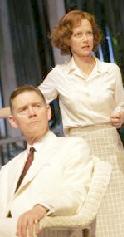SITE GUIDE
SEARCH
REVIEWS
FEATURES
NEWS
Etcetera and
Short Term Listings
LISTINGS
Broadway
Off-Broadway
NYC Restaurants
BOOKS and CDs
OTHER PLACES
Berkshires
London
California
New Jersey
DC
Philadelphia
Elsewhere
QUOTES
TKTS
PLAYWRIGHTS' ALBUMS
LETTERS TO EDITOR
FILM
LINKS
MISCELLANEOUS
Free Updates
Masthead
Writing for Us
A CurtainUp  London Review
London Review
 London Review
London ReviewThe Letter
|
We never became very intimate.
---- Leslie Crosbie
|

Anthony Andrews as Howard Joyce and Jenny Seagrove as Lesley Crosbie
(Photo: Keith Pattison) |
It sounds like a good idea but it is impossible to listen to the way people from the upper middle classes talked to each other in the 1920s without concealing a snigger. The film of The Painted Veil succeeds because there are brilliant shots of scenery and close ups to convey emotion and lots of almost silent passages. Onstage we can't have long periods of silence and the dated dialogue is such that it is very hard not to play it for pastiche. There were points when Anthony Andrews as the lawyer saviour of Leslie Crosbie seemed to find the words rather over the top and we were into the territory of Footlights reviews. The conclusion is that these 1920s plays are not easy to act straight but not impossible, as the many successful revivals of Noël Coward's plays demonstrate.
The plot of The Letter hinges on a letter that Leslie Crosbie is said to have written to Mr Hammond and which has since fallen into the hands of the Chinese woman "of notorious charater" with whom he lived in the Malay peninsula. She claims that she shot him in self defence after he tried to rape her. "He wasn't a man anymore, he was a savage!" she says. The other main characters are her nice but dim husband, Robert Crosbie (Andrew Charleson) and his lawyer friend Howard Joyce (Anthony Andrews). Working for Joyce is a clever Chinese lawyer, Ong Chi Seng (Jason Chang), Hong Kong educated, but kept in a subservient role by his English employer. Ong Chi Seng has a way of getting Mrs Crosbie off the hook but it will be very expensive for all concerned.
Some of The Letter, like the plot of South Pacific, hinges on a white man taking up with native woman and the shocked, racist way in which this is regarded by the colonial community. This more than anything else dates the piece underlying one of the nastier aspects of colonialism. The way too the ruling class treat their servants, as if they are half wits, is something we don't wish to celebrate.
I liked the scene set in the opium den for its sheer colour and almosphere, sweaty, steamy and full of the smoke from drugs. You can almost smell it! The set in the planter's house is cane furniture, tropical foliage and red sunsets at seemingly all hours of the day. There are clever set changes which call for two men to wheel two bamboo screens across and past each other to reveal the new set through the revealed central swathe of stage. Everyone is dressed in cream linen suits.
Jenny Seagrove's straitlaced Mrs Crosbie seems to belie her passionate nature but then for much of the play she has to hold it in because she is lying. "I didn't want to make a fuss" she says. Anthony Andrews gets the most mileage from his lawyer role and his best scenes are those between Mrs Crosbie and Joyce. Andrew Charleson's Robert Crosbie is a stuffed shirt of a husband. There are interesting cameos from Peter Sandys-Clarke as John Withers the stiff upper lipped representative of the British consulate.
There are moments when the audience has to laugh because it all seems so very ridiculous and what we are watching is a comedy of manners and historical parody. I was waiting for the complicated twist to the plot but it never came. I don't see The Letter being as successful as it was as a play in the 1920s nor as William Wyler's film in the 1940s with Bette Davis as Mrs Crosbie. Go and see the movie of The Painted Veil instead! (Editor's Note: Or if you can get hold of a the Bette Davis/Herbert Marshall golden oldie DVD version!)
|
THE LETTER
Written by W. Somerset Maugham Directed by Alan Strachan Starring: Jenny Seagrove and Anthony Andrews With: Chris McCalphy, Jamie Zubairi, Andrew Joshi, Peter Sandys-Clarke, Andrew Charleson, Jason Chan, Sioned Jones, John David Yu, Liz Sutherland, Karen Ascoe Design: Paul Farnsworth Lighting: Jason Taylor Sound: Ian Horrocks-Taylor Composer: Catherine Jayes Running time: Two hours 15 minutes with one interval Box Office: 0870 950 0925 Booking to 11th August 2007 Reviewed by Lizzie Loveridge based on 4th May 2007 performance at the Wyndham's Theatre, Charing Cross Road, London WC2 (Tube: Leicester Square) |
|
London Theatre Tickets Lion King Tickets Billy Elliot Tickets Mary Poppins Tickets Mamma Mia Tickets We Will Rock You Tickets Theatre Tickets |




